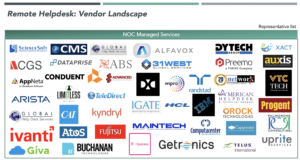The remote helpdesk market is a fast-growing business in the IT industry. It’s an increasingly popular choice for companies that need to provide IT support and increase their efficiency while reducing costs. Remote helpdesks offer benefits such as lower personnel costs, improved SLAs (service level agreements), and avoiding problems when employees leave because they can’t get back into the office easily or at all due to geography or other circumstances.
The remote help-desk market is a fast-growing business in the IT industry.
The remote helpdesk market is a fast-growing business in the IT industry. The market is expected to grow at a rate of 7.3% per year and reach $12.3 billion by 2023, according to research firm IDC’s annual estimates for the global remote help desk (RHD) market. It’s projected to reach $16.3 billion by 2027 — meaning it will be worth more than half of all software sales that year!
Contact me to get a copy of this report at a nominal price. The table of content include the:
- Market Size – Global and US
- Key Cost Metrics
- Trends
- Ecosystem
- Tools & Platforms
- Service Portfolio
- Competitor Landscape
- Competitor Intelligence – selected companies
Remote help desks are helpful when companies grow quickly and build offices in far-flung locations.
Remote help desks are especially useful when companies grow quickly and build offices in far-flung locations. Employees can work from home, which helps them maintain strong connections with their families. Additionally, the fact that employees don’t have to commute means they’re more likely to take vacations or spend time with loved ones at home.
Many companies offer remote help-desk services.
Many companies offer remote help-desk services. Outsourcing your help desk is a good choice when you have many locations because it can be expensive to hire and manage an in-house staff. It’s also helpful if you’re trying to save money during lean times or have too much business for your current in-house help desk team, which can be hard on employees’ mental health and productivity levels.
Some businesses outsource their remote assistance because they don’t want the added stress that comes with managing multiple locations at once—or because they don’t have time or resources to do so themselves.
Outsourcing your help desk can reduce personnel costs, improve your service level agreement (SLA), and avoid problems when employees leave.
Outsourcing your help desk can reduce personnel costs, improve your service level agreement (SLA), and avoid problems when employees leave. For example, suppose you have a large team of employees responsible for answering customer calls but are not trained in the latest technology or software applications. In that case, you may be spending money on replacing them without realizing it. By outsourcing some of these tasks to an independent contractor or a third-party provider whose employees are trained in those areas and can offer superior customer service—and at a lower cost than hiring new staff members—you’re saving money while improving service levels across all of your departments.
Outsourcing has risks, so it’s important to research vendors carefully.
Before you outsource your support needs, it’s essential to research the vendor thoroughly. Each vendor has different processes and policies for handling customer inquiries, billing issues, and more. Make sure you understand their service level agreement (SLA), security policies, support policies, and pricing structure before signing on any dotted lines.

A remote help desk can be an economical way for companies to provide IT Support
Remote help desk service is an excellent way for companies to reduce their personnel costs and improve the quality of service they offer. When you outsource your IT support, you’ll no longer need to hire or manage staff in-house. This can help save money for both parties—the vendor will pay for itself over time, while you won’t have to worry about a sudden influx of hires at a bad time (like during tax season).
There are also benefits of hiring a remote help desk:
- Improved SLA – A remote team provides 24/7 availability, so customers don’t have any downtime when contacting them. They also have access to live chat or phone support whenever needed; this means that clients aren’t waiting on hold forever waiting for someone who may not be available or is too busy helping someone else before returning their call (and this could lead to even more problems).
- Avoiding employee departures – If employees leave due to poor performance issues within your company, then it could be difficult to find replacements who can do everything needed without causing any more headaches than necessary.”
Conclusion
The remote help-desk market is one of the fastest-growing parts of IT. It’s a great option for companies that need to expand their operations but don’t want to hire more employees or move into new locations. Remote support can be more cost-effective than traditional visits because it doesn’t require travel expenses or time off work. The market is also growing steadily because more people are turning to technology as an essential part of their daily lives. These factors will continue pushing demand higher in 2023 and beyond!






Leave A Comment